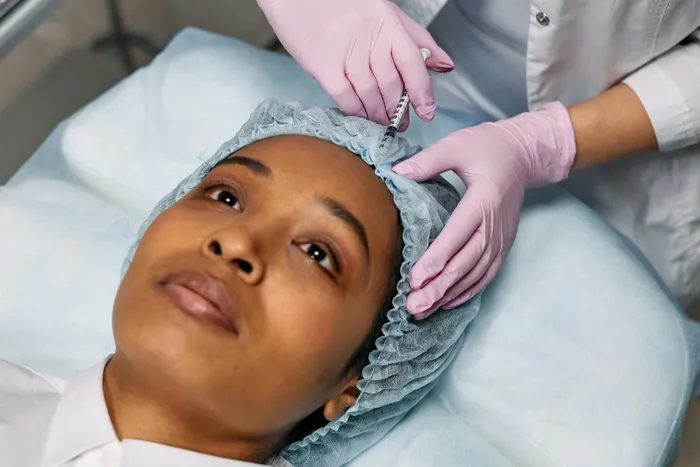Botox treatments in South Africa: what you need to know about safety

Botox is widely used as an anti-ageing treatment, but there are risks if patients opt for budget deals with unregistered clinics.
Image: Cottonbro studio / Pexels
A South African cosmetic treatment expert says there’s no need for panic here following global concerns over a recent case in the United States where a woman was left partially paralysed after having routine botulinum toxin anti-ageing injections, commonly known as Botox.
And while the mother of three survived from what doctors later said was a mild stroke, it set off warning bells among thousands of people who are increasingly turning to the treatment that targets facial muscles, tightens and rejuvenates the skin.
Dr J D Erasmus, a general practitioner with a special interest in aesthetics and the Head of Aesthetics at the Longevity Centre at RXME, says fears of botulism from Botox injections are largely misplaced.

Dr J D Erasmus says South Africans need to be more discerning when choosing where to have cosmetic treatments.
Image: Supplied
“People hear the word ‘toxin’ and understandably get nervous. But iatrogenic botulism (caused by a medical treatment) after aesthetic treatments is extremely rare in medical clinics with qualified doctors who follow proper protocols and only inject trusted products from regulated manufacturers,” he says.
He adds that botulinum toxin is one of the most extensively studied anti-ageing treatments in aesthetic medicine. In addition to smoothing lines and wrinkles, the treatment is also known to relieve tension headaches.
“In cosmetic treatments, it’s used in very small, highly controlled doses by trained professionals. When done correctly, it stays where it’s injected, does its job, and your body naturally breaks it down over time.
"The horror stories we hear are almost always linked to unqualified practitioners, dangerously high doses, and fake or unregistered products, and are not the work of reputable doctors in South Africa.”
In cases of iatrogenic botulism from botulinum toxin injections, the toxin moves further than the treatment area and causes muscle weakness, which is an unusual complication rarely seen in aesthetic injections, he says.
“Globally, thousands of people undergo botulinum toxin procedures safely every day. According to our research, there have not been any recorded cases linked to aesthetic treatments in South Africa.
”Overseas, however, the risks increase where regulations are weaker.
"In one extreme case in Turkey two years ago, 71 people developed iatrogenic botulism from botulinum toxin injections in just over a month, and 66 of those cases were traced to the same clinic."
Erasmus says this latest scare highlights the dangers associated with medical or cosmetic tourism that's poorly regulated.
“You don’t always know what product is being used, who is injecting it, or whether proper safety standards are being followed, and you can’t always follow up with your practitioner if you have any concerns after the procedure.
“These types of incidents are important reminders to take your health seriously and choose a clinic you can trust. Before booking a treatment, check your practitioner’s qualifications and reputation and make sure that the facility follows stringent product quality and safety regulations.”
He says the lure of overseas advertised cosmetic package deals that include flights, hotel stays and same-day treatments that our local doctors cannot match, adds to the problem.
And while many foreign facilities operate responsibly, others might exploit regulatory gaps, employ non-medical injectors or import high-potency botulinum toxins in bulk.
"South Africa’s regulations help prevent the kind of misuse seen in some other countries. Botulinum toxin injections are classed as a Schedule 4 medicine approved by the South African Health Products Regulatory Authority (SAHPRA) or the Food and Drug Administration (FDA) in America.
"Only doctors registered with the Health Professions Council of South Africa (HPCSA) can buy and inject it, and distributors need special permits from SAHPRA to sell it," says Erasmus.
He adds that reputable clinics ensure that every step is carefully controlled, from storing vials at the exact right temperature and mixing them in sterile conditions, to logging batch numbers and safely discarding any leftover product after a set time, keeping the product safe and creating a full record of its use.
Erasmus recommends that patients check that their chosen practitioner is registered with the HPCSA, ask to see the unopened box before it’s mixed, make a note of the lot number in their file, and ensure there’s a clear follow-up plan.
"Ultimately, overseas news stories should serve as lessons about the dangers of taking shortcuts, not as reasons to panic.
"Botulinum toxin has one of the best safety records in aesthetic medicine. In South Africa, if you choose a qualified doctor and a reputable clinic, the risk of serious complications is almost non-existent.”